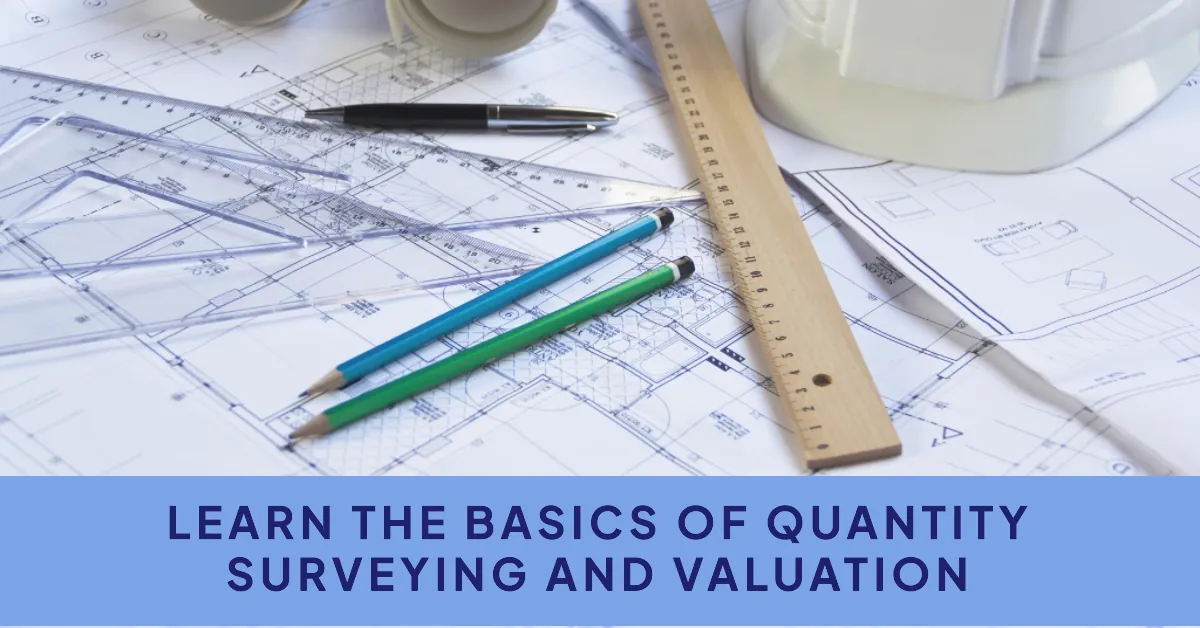Have you ever seen a construction project go over budget and behind schedule? Unfortunately, this is a common problem in the industry. One of the main reasons for this is poor quantity surveying and valuation practices.
Quantity surveying and valuation are two critical aspects in the construction industry. They play a significant role in ensuring that projects are completed within budget and on time, while also ensuring that the quality of work is up to standard.
This article will provide a comprehensive overview of quantity surveying and valuation, including their roles in the construction industry, the factors that affect them, and the interplay between them. It will also discuss some of the industries in which quantity surveyors and valuers work.
Quantity Surveying
Quantity surveying involves the management of all costs related to civil engineering and building projects, from the initial calculations to the final figures.
The QS (Quantity surveyors) seek to minimize the costs of a project while still achieving the desired quality and standards.

Roles of a Quantity Surveyor
- Cost Planning: Quantity surveyors provide detailed and accurate cost planning which enables clients to have an exact estimate of the project.
- Contract Administration: They ensure that contracts are correctly administered, and any variations or changes to the contract are properly documented and agreed upon by all parties.
- Risk Management: Quantity surveyors identify potential risks in construction projects and take necessary steps to mitigate them.
- Tendering: Quantity surveyors assist clients in preparing and evaluating tenders submitted by contractors.
- Progress Monitoring: They monitor the progress of construction projects and ensure that they are completed on time and within budget.
Software Tools Used by Quantity Surveyors
Quantity surveyors use a variety of software tools to measure and calculate quantities, as well as to prepare detailed estimates. Some of the most popular software tools are:
- CostX is a comprehensive software solution for quantity surveying and cost estimation. It offers a wide range of features, including takeoff capabilities, cost estimation, contract administration, and risk management.
- QSPro is a cloud-based software tool for quantity surveying and cost estimation. It offers a variety of features, including takeoff capabilities, cost estimation, and contract administration.
- PriMus TAKEOFF is a specialized software tool for takeoff. It is known for its accuracy and speed.
- PlanSwift is another cloud-based software tool for takeoff. It is known for its ease of use and affordable pricing.
Quantity surveyors also use other software tools, such as Microsoft Excel and BIM software, to support their work.
Valuation
Valuation in construction refers to determining the worth of a building or a property. It is usually done by a professional valuer who assesses different aspects of the property to arrive at its value.
Factors Affecting Valuation
- Location: The location of a property plays a crucial role in determining its value.
- Size: The size of the property, including the built-up area and the total area, also affects its value.
- Condition: The physical condition of the building, its age, design, and quality of construction are other factors considered during valuation.
- Type of property: The type of property, such as residential, commercial, or industrial, also affects its value. Residential properties are generally more valuable than commercial or industrial properties.
Types of Valuations
There are three main types of valuations in construction:
- Market valuations: These valuations are based on the recent sales prices of similar properties in the area.
- Insurance valuations: These valuations are used to determine the amount of insurance coverage required for a property.
- Forced sale valuations: These valuations are used to determine the value of a property if it needs to be sold quickly.
Overall, Valuation is an important process in the construction industry. It is used to determine the market value of properties and assets, which is essential for a variety of purposes, such as buying and selling properties, obtaining financing, and insuring properties.
The Interplay between Quantity Surveying and Valuation
Quantity surveying and valuation are intertwined in many ways. A quantity surveyor’s cost estimate can serve as a basis for valuation. On the other hand, understanding the value of a property can help quantity surveyors make more accurate cost estimates.
For example, if a quantity surveyor is estimating the cost of a new office building, they may need to consider the market value of similar office buildings in the area. This will help them to ensure that their cost estimate is realistic and achievable.
Industries in Which Quantity Surveyors and Valuers Work
Quantity surveyors and valuers work in a variety of industries, including:
- Infrastructure projects: This includes projects such as roads, bridges, airports, and railways.
- Commercial construction: This includes projects such as office buildings, retail centers, and hotels.
- Residential construction: This includes projects such as single-family homes, multi-family homes, and condominiums.
- Oil and gas industry: This includes projects such as oil and gas platforms, pipelines, and refineries.
- Mining industry: This includes projects such as mines, processing plants, and transportation infrastructure.
- Government agencies: Quantity surveyors and valuers are often employed by government agencies to work on public infrastructure projects.
- Consultancies: Quantity surveyors and valuers often work for consultancies that provide professional services to the construction industry.
Quantity Surveying and Valuation Table
The following table provides a summary of the key activities involved in quantity surveying and valuation:
| Activity | Quantity Surveying | Valuation |
|---|---|---|
| Measuring and calculating quantities of materials and labor | Yes | No |
| Preparing detailed cost estimates | Yes | No |
| Advising on appropriate procurement strategies | Yes | No |
| Preparing BOQs | Yes | No |
| Evaluating tenders and tender negotiation | Yes | No |
| Cost planning | Yes | Yes |
| Value engineering services | Yes | Yes |
| Monitoring project costs and cash flow | Yes | No |
| Lifecycle costing | Yes | Yes |
| Technical auditing and taxation | Yes | Yes |
| Dispute resolution | Yes | Yes |
| Cost planning for various contractor activities | No | No |
| Preparing precise detailed information for contractor activities | No | No |
| Pricing BOQs | No | No |
| Finalizing of measurement details with client QS | No | No |
| Maintaining of project progress database | Yes | No |
| Administer conditions of contracts | Yes | No |
| Cash flow forecasting | Yes | No |
| Dealing with subcontractor payments | No | No |
| Advising on economical procedures | Yes | Yes |
As you can see, quantity surveying and valuation are two distinct but interrelated professions. Quantity surveyors focus on the cost of construction projects, while valuers focus on the value of properties and assets. However, both professions require a strong understanding of the construction industry and the factors that affect the cost of construction projects.
Quantity surveyors and valuers play a vital role in all of these industries by helping to ensure that projects are completed on time, within budget, and to a high standard of quality.
Also Read: Types of Quantity Surveyors: Understanding Roles and Specializations
Conclusion
In conclusion, quantity surveying and valuation are essential practices in the construction industry. They ensure cost-effectiveness, adherence to budgets, and realization of value in construction projects. As such, professionals in these fields play a crucial role in shaping our built environment.

